2023
73rd Berlin International Film Festival
February 16 – 26, 2023
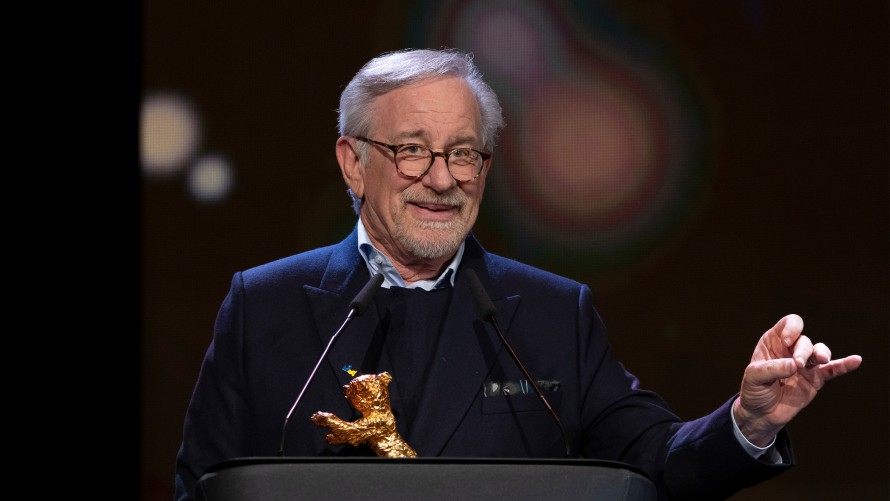
Best of Berlinale 2023
“With our programme, I am attempting to create a kind of map which lets audiences choose their own route through the most pressing issues of our time.”
Carlo Chatrian (in conversation with Claudia Reinhard, “Berliner Zeitung”, February 1, 2023)
The youngest jury president of all time. Politically active and glamorous. Her charismatic aura shaped largely by her clear points of view. The crowd of fans beside the Red Carpet yell her name into the cold night air. The cast and crew of the festival’s opening film arrive, stars saunter towards a Berlinale Palast thronging with ministers and international dignitaries. The show goes without a hitch. At its climax, Sean Penn introduces the protagonist of his documentary Superpower via a live video link to a president whose country of Ukraine is at war. A sustained standing ovation. Then Volodymyr Zelensky speaks for a good ten minutes. When he has finished, some of the seasoned film personalities in the audience have tears in their eyes. The 73rd Berlin International Film Festival is underway.
Marked by Politics
Following two years of Covid-related uncertainty and upheaval, Mariëtte Rissenbeek and Carlo Chatrian had promised a new beginning. The festival’s opening night exceeded all expectations, creating a strong sense of community during troubled and threatening times. The event that befell Europe like a nightmare at the end of the 72nd Berlinale now set the agenda for the 73rd edition: the Russian war of aggression in Ukraine, which marked its first anniversary during the festival period. World politics, the brutal cacophony of oppression and resistance, aggression and defence, forced its way to the centre of the festival discourse – but it was coupled with a sparkling return of glamour which many observers had sorely missed in recent years.
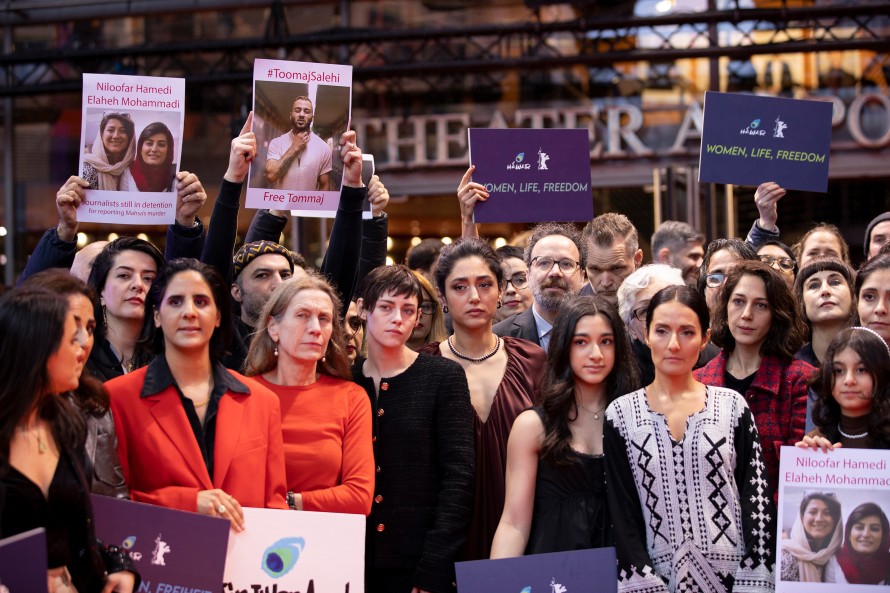
WOMAN, LIFE, FREEDOM - Mariëtte Rissenbeek, Jury President Kristen Stewart, Golshifteh Farahani and Carlo Chatrian express solidarity with the protesters in Iran
The figurehead of this alliance was Kristen Stewart, the actor and director who chaired the International Jury in 2023. She appeared on the front pages of the tabloids but also on the Red Carpets in demonstrations of solidarity with Iran and Ukraine – and of course, as a representative of the queer community, she attended the presentation of the TEDDY AWARD. Kristen Stewart was joined on the jury by the actor Golshifteh Farahani who was forced to leave her home country of Iran many years ago due to the repressive actions of its regime and who set the tone at the jury’s morning press conference: “In a country like Iran, which is a dictatorship, art is not an intellectual or philosophical thing, it is essential, it’s like oxygen.” At the opening night gala, Golshifteh Farahani followed Volodymyr Zelensky and called for unconditional solidarity with the Iranian Revolution – the term she explicitly used for the ongoing struggles between the government and its citizens, saying: “We need you to stand on the right side of history.” The protests in Iran had been ignited by the death of 22-year-old Jina Mahsa Amini who was arrested by the morality police in mid-September 2022 and died in contested circumstances. “Jin, Jiyan, Azadî – Woman, Life, Freedom!” The slogan of the Kurdish women’s movement subsequently became a global battle cry which was also omnipresent at the Berlinale – as a banner at the Red Carpet and projected onto one of the tower blocks next to the Zoo Palast cinema.
Russian and Iranian artists were not excluded per se from the festival in 2023. However, the management set out clear red lines: “We already announced in the summer that we didn’t want to boycott either Russia or Iran but that we would very carefully check who is working for whom and which films are financed by which state bodies” (Mariëtte Rissenbeek, in conversation with Melanie Goodfellow, “deadline”, January 20, 2023).
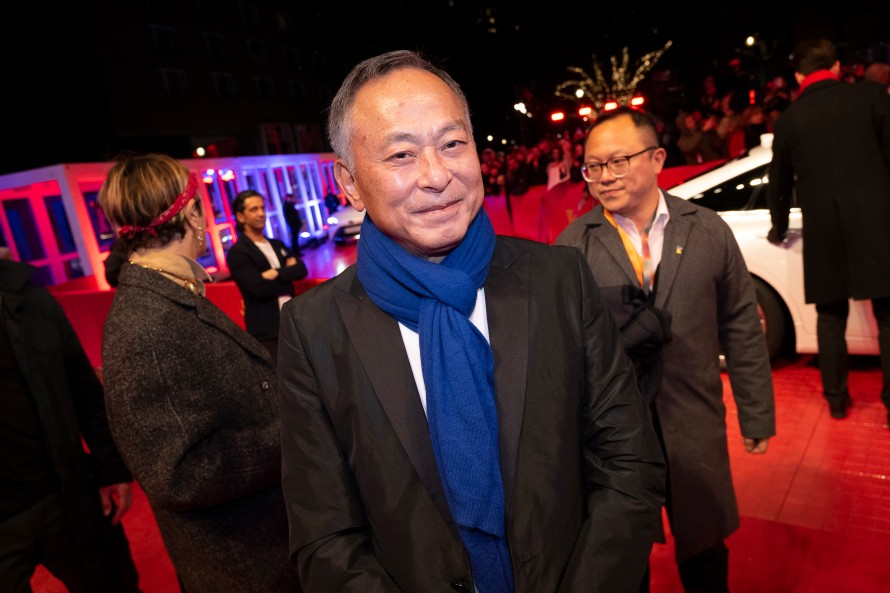
A popular guest at the Berlinale for more than 20 years, 2023 as a member of the International Jury: Johnnie To
The urgent global conflicts with their many ramifications coalesced around the heart of the festival and formed its substance. The director and producer Johnnie To – doyen of Hong Kong cinema and also a member of the International Jury – addressed the altered situation for filmmakers under the Chinese leadership in his home city in rather hushed tones: “For me, cinema has always been in the vanguard. When totalitarian rule emerges, when people lose their freedoms, cinema is the first to take the hit. In most cases, cultural production will be forcefully suspended, since the cinema speaks directly to the audience. That’s why dictators always target the cinema. I think Hong Kong… No, sorry. I think all the countries and peoples fighting for freedom across the globe should support the cinema. Because the cinema speaks out on behalf of you.” (quoted in “The Hollywood Reporter”, February 19, 2023). This completed the axis of a new, competing world order – and, as if to confirm it, Russia, Iran and China held joint military manoeuvres in mid-March.
Carlo Chatrian’s foreword to the programme booklet also referenced the global tectonic shifts in power: “This year, more than ever, being part of the Berlinale means standing shoulder to shoulder with those who fight to express their ideas.” A consensus in support of freedom and peace was affirmed. In view of the critical situation in the world, there was hardly any room for dissent – which some observers missed. For example, Andreas Scheiner wrote in the “Frankfurter Rundschau” on February 26, 2023: “[Carlo Chatrian] has programmed a number of Ukraine documentaries which is all well and good. But he has not permitted any unpleasant perspectives. We are denied a Russian view.” The sole controversy to flare up was around the Norwegian animated film Helt super (Just Super) by Rasmus A. Sivertsen in Generation Kplus, with its premiere being postponed due to allegations of blackfacing.

Testimonies of a world coming apart at the seams:Shidniy front by Vitaly Mansky and Yevhen Titarenko and Seven Winters in Tehran by Steffi Niederzoll
The Onslaught of Reality
The Ukraine war permeated the sections – chiefly in documentary form. And it was not just Hollywood star Sean Penn who suddenly found himself caught up in the brutal upheavals caused by the Russian attack. As it happened, he and his co-director Aaron Kaufman were filming in Kyiv on February 24, 2022 when Putin launched his war of aggression. That same night, they had the opportunity to interview Zelensky and this formed the initial spark for their cinematic homage to Ukraine and its president. In the Encounters section, Vitaly Mansky and Yevhen Titarenko plunged us directly into the bloody conflict in their film Shidniy front (Eastern Front) in which Titarenko brought the unembellished images he had captured at the front as part of the Hospitaller medical battalion to the big screen, providing a view of Europe that would have been completely unthinkable just one year previously. With his Panorama entry Iron Butterflies, Roman Liubyi took a step back into history, reconstructing the 2014 downing of the Malaysian passenger jet MH17. As Thomas Abeltshauser observed in the “Berliner Morgenpost”: “Using an impressive collage of archive material, news images and social media videos, Liubyi exposes the strategies and mechanisms of Russian warfare which was deliberately utilising disinformation and propaganda, and that long before the term “fake news” became popularised. And in doing so, he sensitises us to handling sources of information today” (February 14, 2023). Films about Ukraine could also be found in the Forum, Generation and Berlinale Shorts sections while the European Film Market followed suit with an extensive range of activities focusing on the war-torn country.
The Berlinale has a long-standing relationship with Iranian cinema – think of Jafar Panahi, Asghar Farhadi and Mohammad Rasoulof – which was also strongly in evidence in 2023. The Panorama opened with the animated film La Sirène (The Siren) by Sepideh Farsi which addresses the Iran-Iraq war of the 1980s. Steffi Niederzoll won the Compass-Perspektive-Award for her documentary Sieben Winter in Teheran (Seven Winters in Tehran) which tells the story of the Iranian Reyhaneh Jabbari who was sentenced to death. Other films about the country featured in the Encounters, Forum & Forum Expanded and Generation sections. An undeniable new and politically charged reality was present in the programme, as Carlo Chatrian announced in the run-up to the festival: “The Berlinale will reflect reality very closely. This applies both to documentaries and feature films. Artists want to make very clear statements here” (in an interview with Peter Zander, “Berliner Morgenpost”, January 21, 2023). Art was taking a stand and the Berlinale provided the perfect stage for it. Panel discussions at Berlinale Talents and a WCF Day dedicated to Iran and “Funding Cinema Cultures during Crises and War Time” completed the picture.
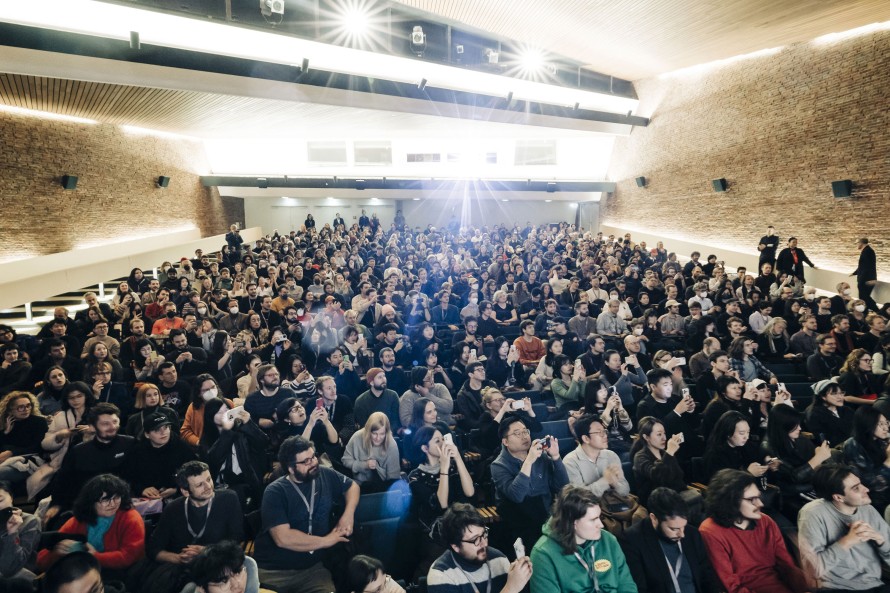
Sold out: the Akademie der Künste at the premiere of the Encounters entry mul-an-e-seo by Hong Sangsoo
Varied Reactions to a Wide-Ranging Programme
The response to the festival programme was not, however, limited to its political dimension. The wide-ranging nature of the sections’ selections was welcomed and the international press saw the Competition as well-balanced and in a positive light. Jonathan Romney wrote in the “Guardian”: “Berlin has often been seen as programming too earnestly, its regard for cinematic art often eclipsed by its sense of political responsibility. These days, (…) the festival is fearless about foregrounding cinema with a capital C, with an eye to adventure. This year’s competition included some films that were as challenging as we’ve seen here in a while, along with others that were hugely accessible” (February 25, 2023). Jessica Kiang even announced in the “New York Times”: “This Year, the Berlin Film Festival Sparkles” (February 24, 2023).
The assessments of German-language commentators were at times more critical. The absence of global conflicts and the tendency of the works to withdraw into the private sphere were noted. As Katja Nicodemus soberly wrote in “Die Zeit”: “Across the continents, the extended family has won its place as a cinema metaphor of the post-pandemic age. But the stories these films tell (with conflicts about trans children, social decline and inter-generational fault lines) do not seem to venture beyond the threshold of the (parental) home. Like the families they depict, the films revolve around themselves” (March 1, 2023). Many voices called for more courage in the festival’s main section – for a cinematographic risk that was often found beyond the Berlinale Palast in the Academy of Arts, host of Encounters: “It is becoming increasingly clear that the Encounters section introduced by Chatrian is overshadowing the Competition in terms of quality. (...) In the future, the Competition will require more such films so as not to disappear into artistic mediocrity with a cinema of the well-meaning. (...) There were enough interesting aesthetic positions (including radical and completely absurd ones) this year” (Andreas Busche, “Tagesspiegel”, February 25, 2023).
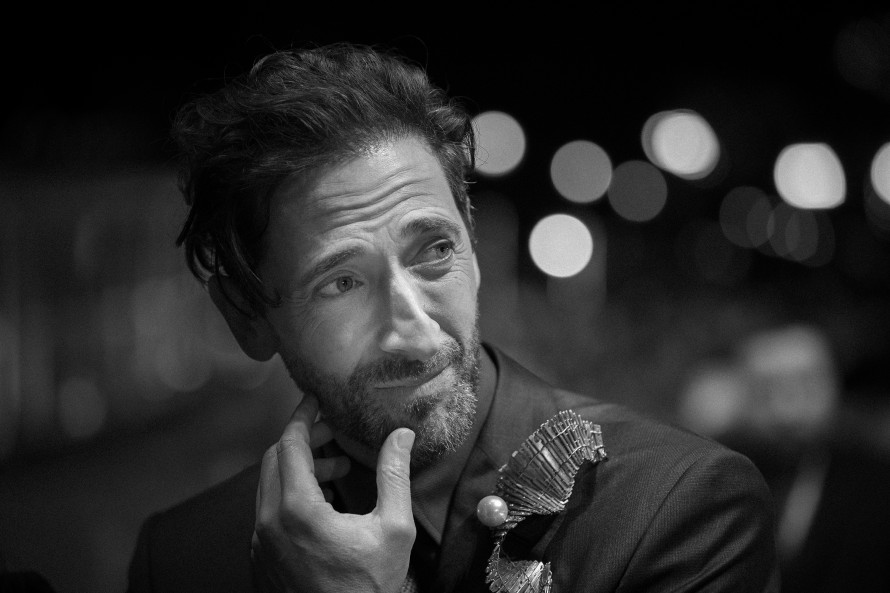
Represented in the Competition with John Trengove’s Manodrome: actor Adrien Brody
However, some of the Competition’s sternest critics seemed caught in an endless loop and assailed the section with the same old arguments that have become rote for years: complaints about the supposed lack of major US productions, comparisons with the Cannes and Venice festivals. What they were overlooking was the Berlinale’s conscious orientation towards independent film, without losing sight of larger productions. Attentive observers, on the other hand, were able to appreciate this. As Arabella Wintermayr responded in “freitag”: “This fatalistic reckoning is not necessarily justified. What is more, some of the critical barbs quite simply miss their mark. After all, they fail to hit what the Berlin International Film Festival is all about, and not just recently” (issue 09/23). By adding: “The Berlinale is a declaration of love to arthouse cinema, especially for its, at times, more unwieldy variants,” she confirmed the route which Chatrian repeatedly elucidated in interviews: “The festival has become probably the best support for independent cinema. It’s good to give room to new voices and this year, we have done a great job” (in conversation with Melanie Goodfellow, “deadline”, January 23, 2023).
The Bears
What was undisputed was the fact that the range of cinematic forms in the Competition was broader than ever before. It even included two animated films, Art College 1994 by Liu Jian and Suzume by Makoto Shinkai, while Nicolas Philibert’s Sur l’Adamant (On the Adamant) was only the second time in the festival’s history – after Gianfranco Rosi’s Fuocoammare (Fire at Sea) in 2016 – that a documentary won the Golden Bear. Philibert’s long-term observation of a mental-health facility on the banks of the Seine in Paris was the surprise winner of the evening which nobody had predicted. Favourites like Past Lives by Celine Song, on the other hand, went home empty-handed. Estibaliz Urresola Solaguren’s 20.000 especies de abejas (20,000 Species of Bees) at least bagged the Silver Bear for Best Leading Performance – for Sofía Otero who, at nine years old, became the youngest-ever winner of a main award.
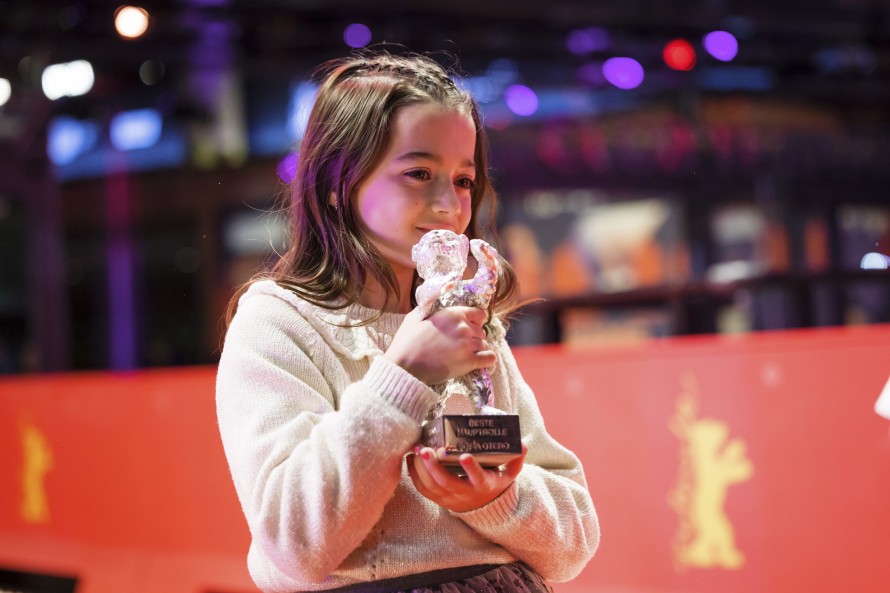
The youngest-ever winner: Sofía Otero, awarded for Best Leading Performance in Estibaliz Urresola Solaguren’s 20.000 especies de abejas
The decisions of the International Jury also reflected the strong presence of German productions in the 2023 Competition. Three of the five national films received awards, with Christian Petzold taking home the Silver Bear Grand Jury Prize for Roter Himmel (Afire) and Angela Schanelec the Silver Bear for Best Screenplay for her free Oedipus adaptation, Music, which received rave reviews, particularly internationally. Thea Ehre was awarded the Silver Bear for Best Supporting Performance – even though many viewers tended to see hers as the leading role in Christoph Hochhäusler’s Bis ans Ende der Nacht (Till the End of the Night). This means that, since the introduction of the gender-neutral awards in 2021, no male has succeeded in winning an acting accolade. And in 2023, this was once again not just a concession to the demands of the zeitgeist: both Ehre and Otero play trans characters. As Claudia Reinhard argued: “Anyone who wants to talk about politically motivated awards here has probably not watched the fantastic performances and films”. (“Berliner Zeitung”, February 26, 2023).
Further Highlights
There were no grounds for complaints about the lack of star power in 2023: Fan Bingbing, Peter Dinklage, Jesse Eisenberg, Cate Blanchett, John Malkovich, Sydney Sweeney, Helen Mirren and many more were guests of the festival. And the award of the Honorary Golden Bear sent everyone into raptures, paying tribute to a legendary director whose renown could hardly be surpassed, who has shaped and repeatedly reinvented Hollywood with his work for decades: Steven Spielberg. The tumult around the Red Carpet preceding the award presentation was no less loud and crowded than on the opening night. Another legend – U2’s Bono – gave a rousing speech for the guest of honour who modestly admitted to being overwhelmed: “The bashfulness comes mostly from being aware that I haven’t achieved anything as a solo act. All my films have been collaborations with great artists. And so, of course, my life, my family is a collaboration” (quoted in “Der Spiegel”, February 22, 2023). Daniel Kothenschulte enthused in the “Frankfurter Rundschau”: “Whichever topic was fired at the most famous living filmmaker – and it must be said, in fairness, that every question displayed genuine admiration – his answers turned it quasi into gold” (February 22, 2023).
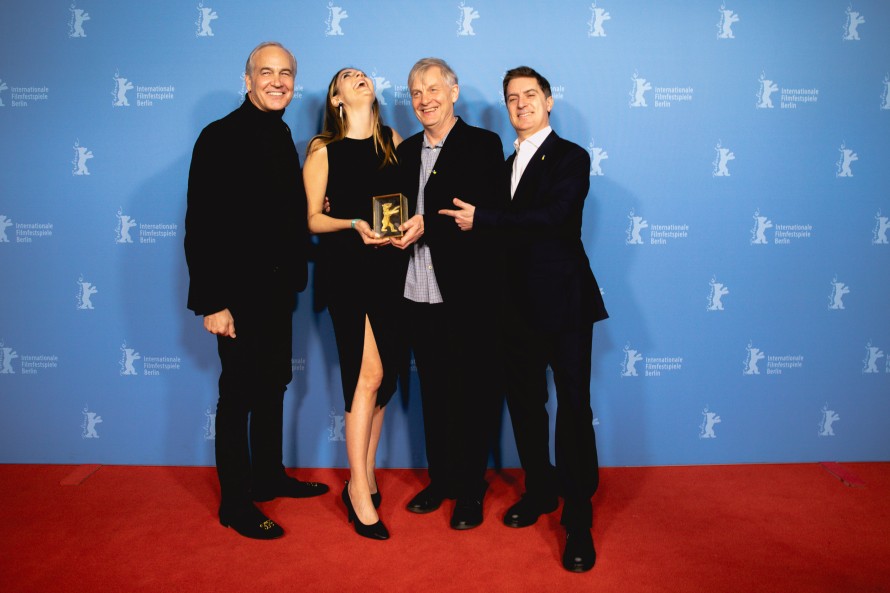
The happy winners: the The Good Mothers team Daniel Frigo, Elisa Amoruso, Julian Jarrold, Alessandro Saba
2023 saw the inauguration of the Berlinale Series Award, making it the first prize of its kind to be presented at an A-festival. The jury selected the mafia series The Good Mothers, which had a strong broadcaster behind it with Disney+. At the same time, Mette Heeno, André Holland and Danna Stern were unable to resist the charms of the low-budget Norwegian series Arkitekten (The Architect) and awarded it a Special Mention.
New Venues
The war of aggression against Ukraine had an indirect but significant impact on festival preparations. The embargoes imposed on Russia caused energy and overall production and consumer prices to rise – often by staggering amounts. The festival budget had to be increased and ticket prices slightly raised. And as in previous years, the management had to find some new solutions with regard to the venues because some traditional cinemas were unavailable. The Friedrichstadt Palast was out of commission due to renovation work. Similar work also led capacity at the CinemaxX to be reduced by more than half. This meant a new home had to be found for major premieres because the CinemaxX cinemas could only be used for press screenings and industry presentations. A replacement was secured in good time with the Verti Music Hall in the Friedrichshain district of Berlin. As a consequence, however, following the closure of CineStar in 2020, Potsdamer Platz continued to lose its significance as the centre of the festival with just the Berlinale Palast and the Arsenal cinema remaining as festival locations open to the general public there. The other venues were now spread across the capital. Mariëtte Rissenbeek emphasised the positive aspects of this development: “We want to take the new situation as an opportunity. Berlin is so big and the audience comes from all over. That’s why I don’t think it’s a bad idea to say, ‘We’re coming to you!’ instead of the entire audience having to come to Potsdamer Platz” (in conversation with Claudia Reinhard, “Berliner Zeitung”, February 1, 2023). To mark the screening of Sonne und Beton (Sun and Concrete) by David Wnendt, an adaptation of Felix Lobrecht’s eponymous novel set in Gropiusstadt, the Berlinale Goes Kiez special presentation was for the first time a guest in that part of the Berlin district of Neukölln.
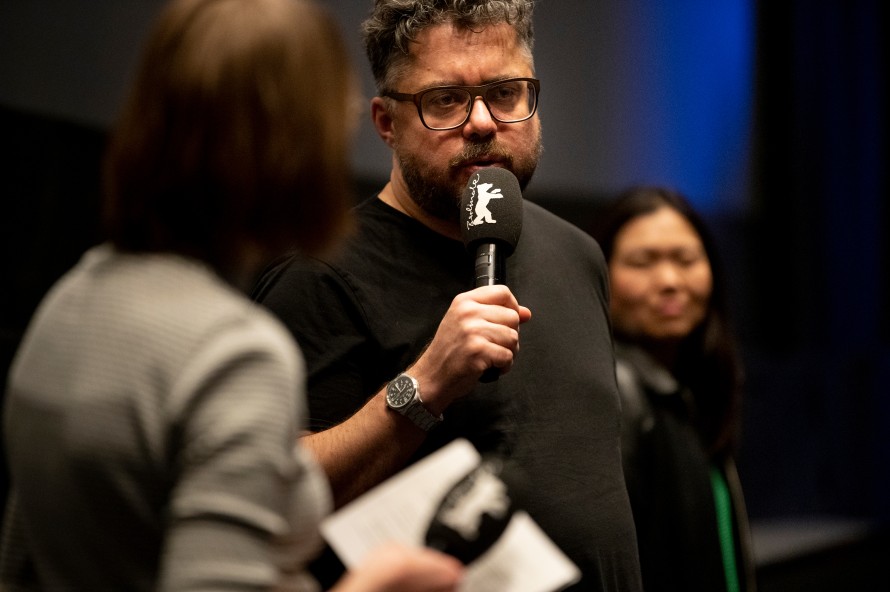
Q&A with Sun and Concrete director David Wnendt at UCI Luxe Gropius Passagen
Familiar Faces in New Roles
New section heads Jenni Zylka and Sebastian Markt celebrated successful debuts at the 73rd Berlinale. Despite this being their premiere outings, they ensured a lot of continuity: Markt had been programming for Generation for many years under his predecessor Maryanne Redpath while Jenni Zylka, who took over the Perspektive Deutsches Kino section from Linda Söffker in August, was best known for her long-term work hosting the Berlinale press conferences, as well as being a member of the Panorama selection committee since 2006. Another internal change took place with Barbara Wurm being announced as Cristina Nord’s successor shortly after the festival’s conclusion – seeing her move from being a member of the Competition selection committee to heading the Forum section.
A Vanished Virus
People had come to terms with the virus which had affected global and local interaction for three years. It had not gone away, but interest in it had. It disappeared from the headlines in a strangely quiet manner and was gradually forgotten (even in the 2023 programme, with the exception of Stefano Savona’s Le mura di Bergamo (The Walls of Bergamo), it scarcely played a role). In the eyes of officials, the number of people who had been vaccinated and/or had recovered from the virus ensured that this degree of “basic immunisation among the population” made it possible to allow all restrictions to lapse. People were still recommended to wear a mask in the venues, but it was no longer mandatory. The good news was that the cinemas could return to full capacity. In the run-up to the festival, there were still large concerns about whether audiences, who form the heart of a public festival like the Berlinale, would return after two pandemic editions. As Mariëtte Rissenbeek stated in an interview with “Variety” in late January: “However the current situation in German cinemas is a bit different than in the pre-pandemic days. Not all of the audience has gone back into movie theatres. The festival can be a great motivator for people to bring people back, and that’s how we want it to work” (in conversation with Mick Vivarelli, January 23, 2023). Yet the opening night already proved such concerns to be unfounded: “No more lockdowns, masks or avoiding mingling with the crowds. (…) Finally! Happiness is etched all over the faces of Berlinale fans” (Christiane Peitz, “Der Tagesspiegel”, February 16, 2023). By the end of the eleven-day festival, 327,600 tickets had been sold. Taking into account a smaller number of films and screenings and a slightly reduced capacity in the venues, this meant a higher percentage of seats sold than before Covid – and a sign of hope for a cinema scene which is still in recovery. As Carlo Chatrian neatly summed it up on the first red carpet of the festival: “We’re back!”
Facts & Figures of the 2023 Berlinale
| Visitors | |
|---|---|
| Total amount of theater visits | 447.900 |
| Tickets sold | 327.600 |
| Professionals | |
| Accredited guests (press excl.) | 17.733 |
| Countries of origin | 132 |
| Press | |
| Journalists | 2.745 |
| Countries of origin | 81 |
| Screenings | |
| Number of films in the public programme | 300 (incl. 13 Forum Expanded installations) |
| Total amount of screenings | 1.021 |
| European Film Market | |
| Film industry participants | 8.927 |
| Number of films | 773 |
| Number of screenings | 1.533 |
| Stands / offices | 230 |
| Number of exhibitors | 612 |
| Berlinale Co-Production Market | |
| Participants | 601 |
| Countries of origin | 59 |
| Berlinale Talents | |
| Participants | 203 |
| Countries of origin | 68 |
| Annual budget | €32.3 million |
| The Berlin International Film Festival receives €12.9 million in institutional funding from the Federal Government Commissioner for Culture and the Media. | |